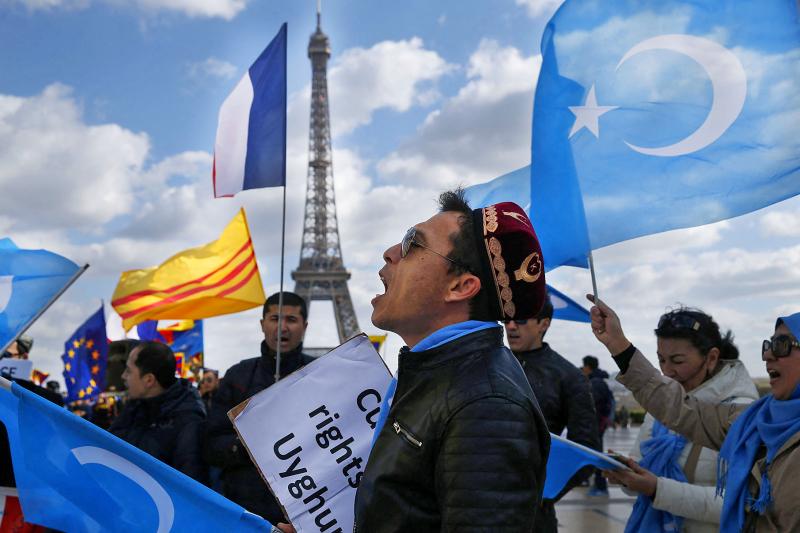Nearly one in 25 people in a county in the Uighur heartland of China have been sentenced to prison on terrorism-related charges, in what is the highest known imprisonment rate in the world, an Associated Press (AP) review of leaked data shows.
A list obtained and partially verified by the AP cites the names of more than 10,000 Uighurs sent to prison in just Konasheher county alone, one of dozens in southern Xinjiang.
The list is by far the biggest to emerge to date with the names of imprisoned Uighurs. It confirms what families and rights groups have said for years: China is relying on a system of long-term incarceration to keep the Uighurs in check.

Photo: AFP
Under searing international criticism, Chinese officials announced the closure in 2019 of short-term camps where Uighurs were held without charges, but thousands of Uighurs still languish for years or even decades in prison on what experts say are trumped-up charges of terrorism.
The list was obtained by Xinjiang scholar Gene Bunin from an anonymous source who described themselves as a member of China’s Han Chinese majority “opposed to the Chinese government’s policies in Xinjiang.” It was passed to the AP by Abduweli Ayup, an exiled Uighur linguist in Norway.
The AP authenticated the list through interviews with eight Uighurs who recognized 194 people listed, as well as legal notices, recordings of telephone calls with Chinese officials, and checks of address, birthdays and identity numbers.
Even a conservative estimate places Konasheher’s imprisonment rate at more than 10 times that of the US, one of the world’s leading jailers, according to US Department of Justice statistics.
It is also more than 30 times higher than for China as a whole, according to state statistics from 2013, the last time such figures were released.
“It is really remarkable,” said Darren Byler, an expert on Xinjiang’s mass incarceration system. “In no other location have we seen entire populations of people be described as terrorists or seen as terrorists.”

CHAOS: Iranians took to the streets playing celebratory music after reports of Khamenei’s death on Saturday, while mourners also gathered in Tehran yesterday Iranian Supreme Leader Ayatollah Ali Khamenei was killed in a major attack on Iran launched by Israel and the US, throwing the future of the Islamic republic into doubt and raising the risk of regional instability. Iranian state television and the state-run IRNA news agency announced the 86-year-old’s death early yesterday. US President Donald Trump said it gave Iranians their “greatest chance” to “take back” their country. The announcements came after a joint US and Israeli aerial bombardment that targeted Iranian military and governmental sites. Trump said the “heavy and pinpoint bombing” would continue through the week or as long

TRUST: The KMT said it respected the US’ timing and considerations, and hoped it would continue to honor its commitments to helping Taiwan bolster its defenses and deterrence US President Donald Trump is delaying a multibillion-dollar arms sale to Taiwan to ensure his visit to Beijing is successful, a New York Times report said. The weapons sales package has stalled in the US Department of State, the report said, citing US officials it did not identify. The White House has told agencies not to push forward ahead of Trump’s meeting with Chinese President Xi Jinping (習近平), it said. The two last month held a phone call to discuss trade and geopolitical flashpoints ahead of the summit. Xi raised the Taiwan issue and urged the US to handle arms sales to

BIG SPENDERS: Foreign investors bought the most Taiwan equities since 2005, signaling confidence that an AI boom would continue to benefit chipmakers Taiwan Semiconductor Manufacturing Co’s (TSMC, 台積電) market capitalization swelled to US$2 trillion for the first time following a 4.25 percent rally in its American depositary receipts (ADR) overnight, putting the world’s biggest contract chipmaker sixth on the list of the world’s biggest companies by market capitalization, just behind Amazon.com Inc. The site CompaniesMarketcap.com ranked TSMC ahead of Saudi Aramco and Meta Platforms Inc. The Taiwanese company’s ADRs on Tuesday surged to US$385.75 on the New York Stock Exchange, as strong demand for artificial intelligence (AI) applications led to chip supply constraints and boost revenue growth to record-breaking levels. Each TSMC ADR represents

State-run CPC Corp, Taiwan (CPC, 台灣中油) yesterday said that it had confirmed on Saturday night with its liquefied natural gas (LNG) and crude oil suppliers that shipments are proceeding as scheduled and that domestic supplies remain unaffected. The CPC yesterday announced the gasoline and diesel prices will rise by NT$0.2 and NT$0.4 per liter, respectively, starting Monday, citing Middle East tensions and blizzards in the eastern United States. CPC also iterated it has been reducing the proportion of crude oil imports from the Middle East and diversifying its supply sources in the past few years in response to geopolitical risks, expanding